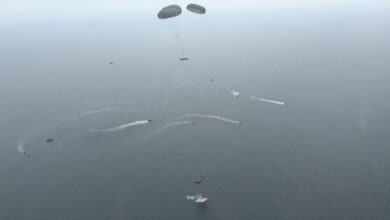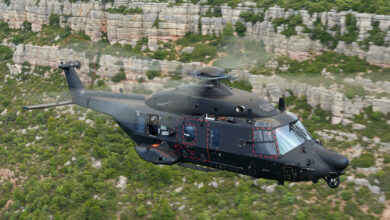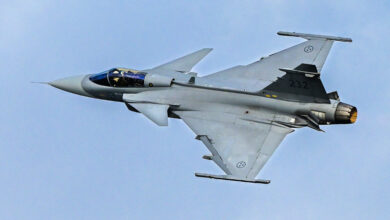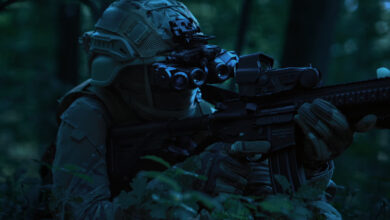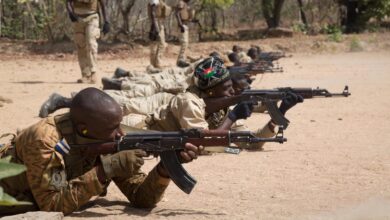France’s armed forces chief says jihadist forces in Mali are on the back foot but the fight to restore peace in the poor Sahel country will be long.
Speaking to AFP and French radio station RFI, General Francois Lecointre said recent attacks by jihadists in Mali should be seen as the sign of a beleaguered enemy.
“The reason why the enemy has reacted so brutally is precisely because we went after him in his last holdouts,” he said last week while visiting troops from France’s Operation Barkhane in Mali.
“Another probable reason is that it has to restore a certain reputation with the public” for its ability to mount attacks, he argued.
Since the start of the month, dozens of Malian troops have been killed in jihadist attacks central Mali, sparking angry protests by their relatives.
“These highly symbolic attacks, which come on the heels of very powerful blows by Barkhane and its allies, are the reaction of someone who feels cornered,” Lecointre said.
“For me, it’s a positive sign.”
But the enemy had not yet been defeated, he said.
“Obviously … these groups are trying to get themselves back together and forge alliances because they have been weakened.”
‘Long battle to change mindsets’
The recent unrest in the Sahel began in Mali in 2012 with Tuareg separatist uprising against the state, which was exploited by Islamist extremists linked to al-Qaeda who took key cities in the desert north.
France began its Operation Serval military intervention in its former colony early the next year, driving the jihadists from the towns, but the militant groups morphed into more nimble formations operating in rural areas, sometimes winning over local populations by providing basic services and protection from bandits.
The insurgency has gradually spread to central and southern regions of Mali, and across the borders into neighboring Burkina Faso and Niger.
The French mission evolved into the current Operation Barkhane, which has 4,500 troops personnel deployed with a mandate for counter-terrorism operations across the region, with 2,700 soldiers in Mali to support poorly-equipped local military forces.
But the deployment comes at a hefty cost and has been subjected to political scrutiny.
Lecointre, 57, said Mali faced a long-term battle for stability.
“I am cautious,” he said.
“It will be a long battle to change mindsets, to ensure the public believes in its State, in a Mali whose competence extends across the whole of the country.
“This is not the kind of work that can be done at the flick of a switch – it has to bring together the military effect and real work in communication and development.”
On Saturday, 130 Fulani villagers in central Mali were killed by an ethnic Dogon militia, a massacre that prompted the government to sack senior military officers and break up the militia.
G5 Sahel task
Lecointre also admitted that early expectations for a France-backed five-nation counter-terror force in the Sahel had been premature.
The G5 Sahel was launched in 2014 to improve cooperation on development and security between Burkina Faso, Chad, Mali, Mauritania and Niger. The five nations began work in 2015 on the G5 Sahel Joint Force, a counter-terrorism initiative which was spearheaded by France, the colonial power in the region.
A June 2017 U.N. Security Council resolution called for international support, and the force launched a month later with a mandate to combat terrorism, transnational organized crime and human trafficking.
According to a March 2018 NATO report, the force aims to maintain seven battalions – two from both Mali and Niger, and one each from Chad, Burkina Faso and Mauritania. Each battalion consists of 550 soldiers plus 100 police or gendarmes, for a total of 4,550.
Troops will work alongside French personnel deployed to Operation Barkhane as well as the the U.N.’s third-largest peacekeeping mission, Minusma in Mali, which has about 12,000 troops and 1,750 police deployed.
But lack of funding and training, as well as poor equipment, have greatly undermined the G5 Sahel Joint Force initiative.
“I think we were too impatient,” Lecointre said.
“We probably pushed for this joint force to make a symbolic commitment to carry out operations when it was not completely ready,” he acknowledged.
There were political gains from the launch, which saw the G5 Sahel gaining a measure of international support, he said.
“However, it is always difficult to build an army, an operational force,” he said.
“It’s politically complicated.”
But the force is now operating within an established legal framework, he said.
“And now the forces made available for the G5 Sahel have to reach capacity, while understanding they are subject to their national armies which are heavily engaged in their respective territories.”
Lecointre said the rising number of jihadist attacks in Burkina Faso was “a source of concern.”
“It indicates a spread of the jihadist movement to the south,” he said.
France was stepping up its cooperation with Burkina Faso and was looking at ways of helping it combat jihadist encroachment in frontier zones, he said.
Push for UN support for G5 Sahel Joint Force
Envoys from the U.N. Security Council have hinted at boosting support for the G5 Sahel Joint Force while on a visit to the region.
In talks with President Roch Marc Christian Kabore, the group “looked in depth at ways of giving a new drive to the G5 Sahel,” France’s ambassador to the U.N., Francois Delattre, said late on Sunday, March 24.
Burkinabe Foreign Minister Alpha Barry said the talks focussed on a “technical arrangement that the [G5 Sahel] leaders have sought.”
It touches on “operational and logistical” support by the U.N. forces in Mali for the G5 force “to make it much more effective,” he said.
Barry said that, so far, cooperation between MINUSMA and the G5 Sahel “was restricted, in terms of execution, to Mali’s national borders.”
“The G5 Sahel members would like this to be extended beyond Mali’s frontiers, meaning that it would cover all of the territory of the G5 Sahel,” he said.
“We have had a very favorable response from our friends on the Security Council.”
Delattre said there would be further talks at U.N. headquarters in New York on March 28 on how to proceed “concretely.”
U.N. Secretary General Antonio Guterres has pledged to pursue support for the G5 Sahel Joint Force. Guterres, as well as France, has lobbied for regular U.N. funding, and the leaders of the G5 Sahel states have called for a permanent mechanism to finance the Joint Force under the U.N. Charter’s Chapter 7.
But the United States has pushed back against U.N. funding, and for African Union-led peacekeeping missions. U.S. It is also seeking to streamline peacekeeping operations to reduce costs and make them more effective.
Last May, the U.S. said it opposed a Security Council mandate for the Joint Force as well as direct U.N. funding, and in November, a U.S. Africa Command spokesperson told The Defense Post that, despite almost doubling U.S. assistance to the G5 Sahel Joint Force member states to almost $111 million, that support takes the form of “bilateral security cooperation efforts,” rather than direct funding for the Joint Force.
With reporting from AFP







